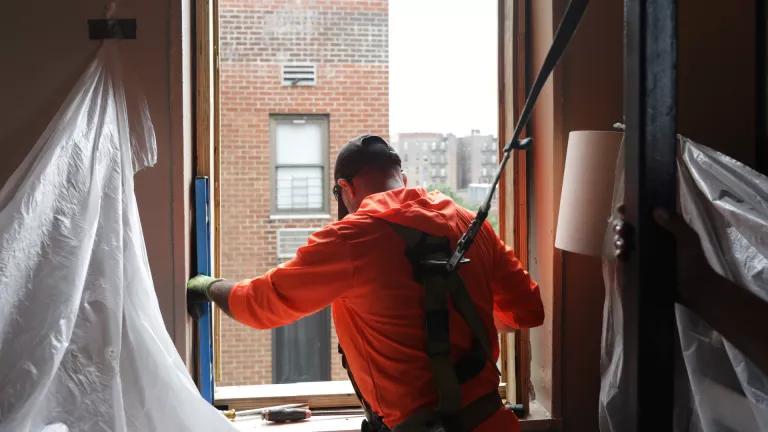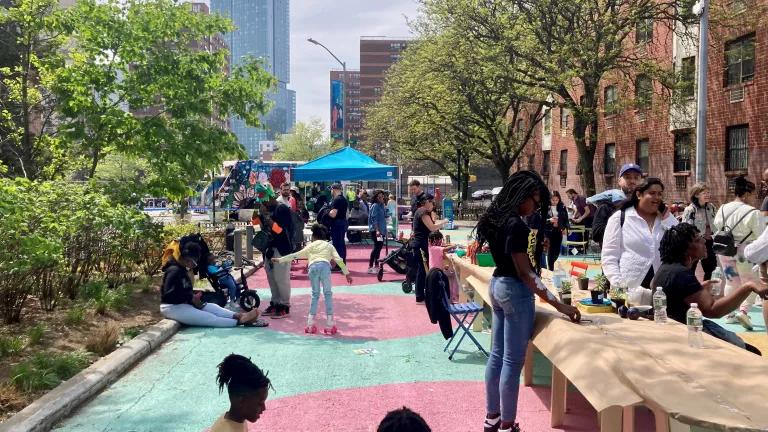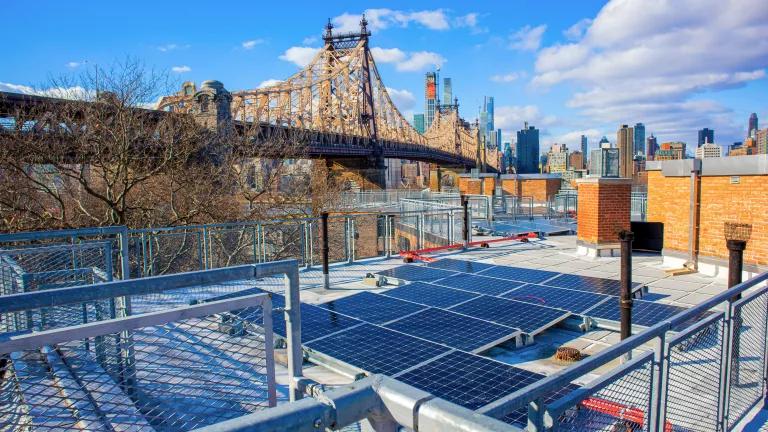Delivering Climate Equity, One Clunky Old Heater at a Time
Fix VA law, for healthier air and lower bills for low-income families, by ditching dirty fossil fuel heaters.

A simple fix to VA law will unlock cleaner indoor air and lower energy burdens for families on lower-income, by ditching dirty fossil fuel heating with high-efficiency heat pumps like these.
Bold action to take on the climate change imperiling all of Virginia must also equitably tackle excessive energy costs, which particularly burden our low-income neighbors' shot at a better livelihood. In the face of that challenge, the good news to celebrate today—Energy Efficiency Day—is the two ready-made solutions at our immediate disposal, to ensure society's collective climate action is both equitable and sustainable for the long-haul.
Last year my colleague Dawone and I celebrated Virginia's new opportunity to lighten the energy burden in low-income homes through new RGGI funding; yet, one year later, there still remain huge untapped opportunities to further reduce energy and environmental inequities for low-income Virginians. All it will take is for our Virginia lawmakers to reach out and grab them, in the soon-to-gavel-in 2022 legislative session.
The immediate opportunities for Virginia to expand our effort to tackle the excessive energy burden on Virginia’s low-income homes is (1) requiring better and more equitable energy efficiency efforts from our slow-to-catch-up monopoly utilities, with a permanent, bill-lowering efficiency standard that is more in line with what leading states are already doing today, and (2) removing a senseless restriction on replacing costly, polluting fossil fueled heaters in low-income homes, with cleaner, cheaper electricity.
So how do we get overpriced, polluting fossil fuels out of Virginia's low-income homes? With a simple, one-word fix to state code: removing the fossil industry’s selfish prohibition on replacing unhealthy fossil fuel home heating with cheaper, healthier electric heat.
The Current Challenge in Low-income Homes
A fossil industry-friendly code provision imposes a costly burden on low-income families: it prohibits existing energy efficiency programs—be they from utilities or funded by RGGI—from “fuel switching” the homes of low-income Virginians, away from unhealthy fossil fuels (fuel oil, propane, and inefficient gas), by replacing them with cheaper, healthier electric appliances.
How the Reform Bill Will Work
The bill changes one word in Virginia’s statutory definition of “energy efficiency program.” Rather than defining efficiency as reducing the use of “electricity,” the bill more accurately defines efficiency as a reduction in the use of total “energy.” With that simple reform, RGGI- and utility-funded low-income energy efficiency programs (likely to exceed $500 million in funding over the next decade) can finally be used to help those low-income customers laboring to pay for outdated, inefficient, and household-polluting fuel oil, propane, and gas heating. How? Simple: by funding the installation of immediately healthier, cheaper electric heating (be it for home heating, water heating, cooking, or all three).
Who Will Benefit from this Commonsense Reform
The bill will directly benefit those low-income Virginians in the nearly 1 in 10 Virginia homes still heated with inefficient and outdated fuel oil and propane, as well as those low-income customers laboring to pay for older, inefficient gas equipment, in the over 1-in-3 Virginia homes still fueled with gas. (Opposition to this commonsense reform from the fossil fuel lobby will therefore be vigorous, as they seek to continue insulating themselves from competing in the open marketplace with more efficient competition.)
The Health & Equity Benefits of Ending the Polluting Status Quo
It's past time to get these noxious clunkers out of the homes of our neighbors: Black, Indigenous, and other communities of color nationwide inequitably suffer disproportionately poor air quality. Indoor air quality contributes to this environmental injustice: fracked gas stoves, furnaces, and water heaters pollute the indoors with carbon monoxide, nitrogen compounds, and others, worsening human health. For example, a comprehensive review revealed children in homes with gas-fueled cooking are at a significantly higher risk of asthma symptoms. Switching to healthier electric appliances through this reform will deliver healthier air, an important need in those communities that already face the worst pollution.
Recent Bill-lowering Successes from Fuel-switching Virginia Households
The lower cost to everyday Virginians from electric heatpumps instead of older fossil fueled heating is proven: recent fuel-switching to electricity reduced the energy bills of multiple homes, by an average of a full 18% annually (with one previously fuel oil-reliant home reducing its monthly energy bill as much as 64%).
Equitable Climate Benefits
In addition to lowering low-income energy burdens, this energy and equity reform will directly reduce Virginia’s climate pollution from buildings as well, which currently accounts for 10% of the Commonwealth’s total carbon pollution. Eight bill-lowering projects already completed in Virginia, for example, reduced those homes’ annual climate pollution by 26%.
The Time Is Now to Get to Work on Equitable Climate Action for All Virginians
As Virginia deploys RGGI-based funding to improve the lives of hard-working Virginians, here's to our legislature building on that success, by directly helping those low-income Virginians still stuck with outdated and costly fossil fuels in their homes, with lower energy bills and cleaner indoor air.
Here's to hoping that on the next Energy Efficiency Day, in 2022, we'll already be looking back to celebrate this important success, for the climate and for equity.




